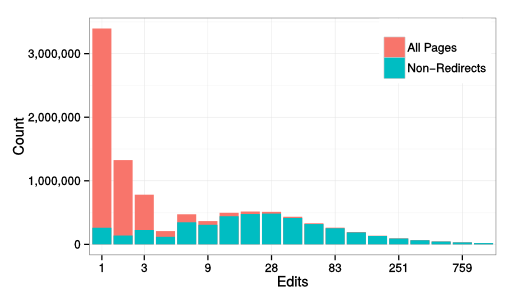Consider the Redirect

Example of a redirect displayed in the Seattle, Washington page on English Wikipedia which is a redirect to Seattle. Note the small redirect notice below the title.
In wikis, redirects are special pages in that silently take readers from the page they are visiting to another page in the wiki. In the English Wikipedia, redirects make up more than half of all article pages.
Different Wikipedia data sources handle redirects differently. For example, the MediaWiki API will automatically "follow" redirects but the XML database dumps treat redirects like normal articles. In both cases, redirects are often invisible to researchers.
Because redirects constitute a majority of all pages and see a large portion of all traffic, Wikipedia researchers need to take redirects into account or their findings may be incomplete or incorrect. For example, the histogram on this page shows the distribution of edits across pages in Wikipedia for every page, and for non-redirects only. Because redirects are almost never edited, the distributions are very different. Similarly, because redirects are viewed but almost never edited, any study of views over articles should also take redirects into account.

Histograms of pages in the article namespace based on the number of edits on a log scale. The red histogram includes all pages in the article namespace (N = 9,729,989). The blue graphs includes only pages that were not redirects at the point of data collection (N = 5,327,561).
Because redirects can change over time, the snapshots of redirects stored by Wikimedia and published by Wikimedia Foundation are incomplete. Taking redirects into account fully involves looking at the content of every single revision of every article to determine both when and where pages redirect.
Much more detail can be found in Consider the Redirect: A Missing Dimension of Wikipedia Research — a short paper that we have written to accompany this dataset and these tools. If you use this software or these data, we would appreciate if you cite the paper:
Hill, Benjamin Mako & Shaw, Aaron. (2014) "Consider the Redirect: A Missing Dimension of Wikipedia Research." In Proceedings of the 10th International Symposium on Open Collaboration (OpenSym 2014). ACM Press. doi: 10.1145/2641580.2641616
Generating Redirect Spells
Generating redirect spells from an MediaWiki XML dump involves two steps:
- Searching the full text of every revision of every page in a dump to determine if any given revision is a redirect.
- Using the results of (1) to generate a list of "spells" that describe periods of time that articles in a wiki redirect to other articles.
We have publicly released software in Python and R to do these two steps under the GNU GPL version 3. The software is designed for people already comfortable with working with MediaWiki XML dumps and the tools and software necessary to do this.
You can download the software from our git repository like:
git clone git://projects.mako.cc/redirect-tools
Detailed documentation on how to use the software is in available in our README file.
Redirect Spell Data
In our paper, we present an analysis of redirect data from English Wikipedia in the dump created in October 2012. You can download the dump files we used from the Wikimedia Foundation dataset archive. Because generating these dumps can be computationally intense, we have published the output of the software above run on the this dump. This includes 9,277,563 redirect spells that our software identified and is the dataset used in the paper.
You can download the dataset in the following formats:
- RData (240MB) — Suitable for use in GNU R
- bzip2 compressed tab separated values (178MB) — Suitable for use in other languages and statistical packages.
Limitations
Taking redirects into account is one important step that Wikipedia researchers should take but it is hardly a panacea. As just one example, in conversations after the publication of this paper, we have realized that page moves may lead to additional challenges in interpreting view data and in some cases to challenges in interpreting redirect data itself. This work reflects a step toward increased validity but it is incomplete.
Depending on the research question, a complete picture may need to take redirects, moves, other administrative actions, changing ways of measuring views, bot and bot-assisted editing, along with other currently unidentified features, into account. We hope to extend our work with redirects and explore these issues and we hope other researchers will join us in these efforts to build a better understanding, tools, and datasets that can improve Wikipedia research.
More Information
For details about the dataset, why it is important, and for examples on how it can be used to come to better findings in Wikipedia research, please read the companion paper.
If you notice issues or bugs in our data or code, contact Benjamin Mako Hill or Aaron Shaw.
Patches and improvements are welcome! Details on how to produce and send a patch using git are online.
This dataset was previously hosted at this now defunct URL: http://networkcollectiv.es/wiki-redirects/
ⓒ Copyright Benjamin Mako Hill and Aaron Shaw :: Creative Commons BY-SA :: Updated: Sun Dec 11 16:43:57 PST 2016